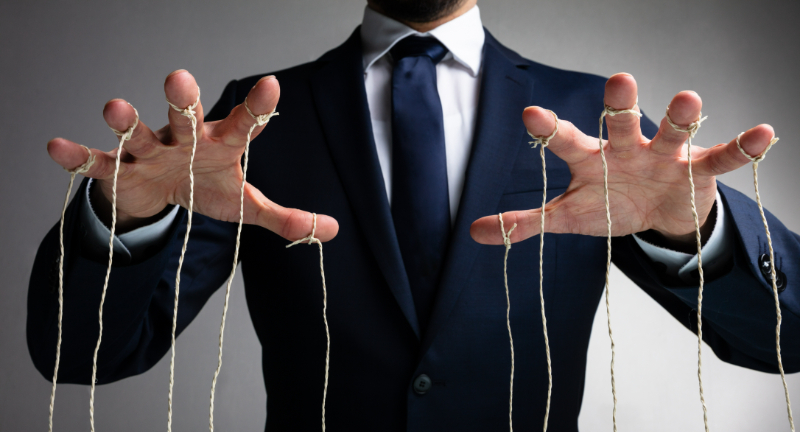Mental Health
People Who Lack Empathy Have These 25 Common Traits
Published
12 months agoon

Shutterstock
Empathy, the ability to understand and share the feelings of another, is a fundamental human trait that fosters connection, communication, and compassion in our relationships. However, not everyone possesses this quality to the same extent. People who lack empathy can sometimes present challenges in social interactions and relationships. Recognizing the traits of those who may struggle with empathy is crucial for understanding and navigating our connections with them. Here, we delve into 25 characteristics commonly associated with a lack of empathy, shedding light on how these traits manifest and impact interpersonal dynamics.
Self-Centeredness

Shutterstock
Individuals showing a strong self-focus often overlook the needs and feelings of those around them, making it hard for them to engage in reciprocal relationships. This self-centered approach can alienate friends and family, who may feel neglected or undervalued when their needs and emotions are consistently sidelined. The inability to see beyond one’s own perspective can severely limit the depth and quality of personal connections.
Difficulty with Emotional Support

Shutterstock
People who lack empathy find it hard to provide comfort or understanding in times of need, often appearing indifferent or awkward in emotionally charged situations. They may struggle to respond appropriately to others’ emotional distress, offering solutions instead of sympathy or simply avoiding the situation altogether. This inability to offer emotional support can strain relationships, leaving loved ones feeling isolated in times of emotional need and questioning the strength of their bond.
Poor Listening Skills

Shutterstock
Listening is a critical component of empathy, allowing us to understand and connect with others’ experiences, but those with low empathy often fail to listen effectively, which hinders meaningful communication. Instead, focusing on their own thoughts or waiting for their turn to speak, this behavior can make meaningful conversations difficult, as others feel unheard and unvalued. It creates a barrier to understanding and resolving conflicts, making it hard for relationships to grow and thrive.
Impatience with Others’ Problems

Shutterstock
A lack of patience for others’ issues is a hallmark of low empathy, leading such individuals to dismiss or trivialize the concerns of others. Such individuals may view discussions about problems not directly affecting them as tedious or unnecessary. Their impatience can manifest as dismissive comments, a lack of attention, or even irritation, further discouraging open communication and deepening the emotional divide between them and others.
Difficulty in Maintaining Close Relationships

Shutterstock
Empathy allows us to form deep, meaningful connections by understanding and valuing others’ feelings and perspectives, a critical foundation missing in those with low empathy. Without it, relationships may lack depth and emotional intimacy, leading to superficial connections that can easily fray under stress or conflict. This makes it challenging to build and maintain close, lasting relationships that are resilient in the face of challenges.
Unwillingness to Help Others

Shutterstock
Empathetic people are often motivated to help those in need, driven by a shared sense of humanity and understanding, but an absence of empathy can result in indifference towards others’ struggles. An individual may show little interest in offering assistance unless there’s a direct benefit to themselves, highlighting a transactional approach to interactions that undermines the spirit of community and mutual support.
Blaming Others for Misfortunes

Shutterstock
Without empathy, taking responsibility for one’s actions in conflicts or misunderstandings is rare, as it’s easier to blame others without considering one’s role in the situation. Instead, people might blame others entirely, not considering the complex interplay of actions and reactions that contribute to situations, thereby avoiding personal accountability. This blame-shifting can erode trust and hinder the resolution of conflicts, perpetuating cycles of misunderstanding and resentment.
Manipulative Behavior

Shutterstock
Manipulation involves using others for personal gain without regard for their feelings or well-being, a strategy that those lacking empathy might employ without moral qualms. Those lacking empathy might employ deceit, charm, or coercion to achieve their ends, seeing others more as means to an end rather than as individuals with their own rights and feelings. This can lead to relationships based on deceit and exploitation, ultimately unsustainable and damaging to all parties involved.
Intolerance to Differing Viewpoints

Shutterstock
Empathy fosters understanding and tolerance for diverse perspectives, but its absence can result in an uncompromising stance toward any differing opinion. Without it, there’s a tendency to view one’s own opinions as superior, leading to conflict and an inability to appreciate the richness of diverse viewpoints and experiences. This intolerance can isolate individuals and groups, creating echo chambers that stifle personal and collective growth.
Emotional Coldness

Shutterstock
An individual who appears emotionally distant or cold may struggle with empathy, making it hard for others to connect with them on a meaningful emotional level. They may have difficulty expressing their own emotions or responding to others’ emotions in a warm and understanding manner, making emotional connections with them challenging. This emotional coldness can leave a lasting impression of aloofness and detachment, pushing others away and hindering the formation of close relationships.
Overly Critical Attitude

Shutterstock
A lack of empathy can result in focusing on others’ flaws or mistakes without recognizing their efforts or the context of their actions, often demoralizing those on the receiving end. This critical stance can demoralize and hurt those around them, damaging relationships and undermining self-esteem. Constant criticism can wear down the resilience and confidence of others, making it difficult for them to share openly or engage in mutual growth.
Inability to Apologize Sincerely

Shutterstock
Genuine apologies require acknowledging one’s impact on others and feeling remorse, a process deeply tied to empathy that is absent in some. Those lacking in empathy might offer insincere apologies that skirt around accepting real responsibility, if they apologize at all. This reluctance to genuinely apologize can prevent the healing of wounds in relationships, leaving unresolved issues to fester and erode trust over time.
Disregard for Social Norms

Shutterstock
Social norms and etiquette are partly based on mutual respect and understanding, aspects grounded in empathy that some may ignore, leading to socially awkward or offensive behaviors. Ignoring these norms can lead to behavior that others find rude, offensive, or inappropriate, as the individual fails to consider or care about the social and emotional impact of their actions. Such disregard can alienate others and create barriers to social integration and acceptance.
Lack of Guilt or Remorse

Shutterstock
Feeling guilt or remorse after causing harm is a direct consequence of empathy, a feeling that might be absent in those with low empathy, leading them to repeat harmful behaviors without understanding the need for change. Without it, individuals may not genuinely feel sorry for the effects of their actions, leading to repeated harmful behaviors without learning or growth. This lack of remorse can make it difficult for others to trust or forgive, knowing that the harmful actions might easily be repeated.
Superficial Charm

Shutterstock
Charm can be used manipulatively by those lacking deep empathy, as a way to navigate social situations or achieve specific goals without forming genuine connections, often leaving others feeling used once the charm fades. This charm often lacks depth, serving more as a tool than an expression of genuine interest or affection. The transient nature of such charm can lead to disillusionment and mistrust among those who were initially swayed by it, as they realize the lack of genuine connection.
Competitiveness at the Expense of Others

Shutterstock
While competition can be healthy, those lacking empathy might pursue victory or success without regard for the harm or detriment caused to others, often justifying their actions as part of the game or necessary for success. Their focus is on winning or achieving at all costs, rather than on fair play or the well-being of competitors. This approach can damage relationships and create a hostile environment, whether in the workplace, in personal relationships, or in social settings.
Avoidance of Emotional Topics

Shutterstock
Individuals with low empathy may steer clear of discussions about feelings or emotions, finding them uncomfortable or irrelevant, and missing opportunities for deeper connection. This avoidance can make it difficult for them to connect on a deeper level or to engage in conversations that require emotional openness. It can lead to a lack of emotional depth in relationships, leaving partners or friends feeling unfulfilled and disconnected.
Inflexibility in Thinking

Shutterstock
A flexible mindset allows for the consideration of various perspectives and solutions, but a lack of empathy can result in rigid thinking, preventing productive dialogue and problem-solving. Without empathy, thinking can become rigid, characterized by a refusal to see beyond one’s own viewpoint or to consider alternative approaches to problems. This inflexibility can hinder personal and professional growth, as well as the ability to adapt to new situations or resolve conflicts effectively.
Insensitive Jokes or Comments

Shutterstock
Humor that comes at the expense of others’ feelings or sensitivities can be a sign of lacking empathy, often causing unintended harm and alienation. Making jokes or comments without considering how they might affect others can lead to hurt feelings and strained relationships. This insensitivity can alienate individuals and contribute to a culture of disrespect, undermining the sense of safety and belonging needed for healthy communities.
Unwillingness to Change or Self-Reflect

Shutterstock
Self-reflection and the willingness to change are often prompted by recognizing the impact of our actions on others, but without empathy, there is little drive to engage in this introspective process. Without empathy, there might be little motivation to self-reflect or adapt behaviors, even in the face of negative outcomes or feedback. This resistance to change can prevent personal growth and development, keeping individuals stuck in patterns of behavior that are harmful to themselves and others.
Dominating Conversations

Shutterstock
Dominating conversations without giving others space to speak reflects a lack of empathy and a disregard for the value of dialogue and exchange. It shows a disregard for the value of others’ contributions and perspectives, making equitable and meaningful exchanges difficult. This dominance can stifle the voices of others, leading to a one-sided relationship where genuine exchange and understanding are rare.
Quick to Anger

Shutterstock
A short temper can indicate an inability to understand and empathize with others’ intentions or feelings, leading to explosive reactions over minor issues. Frustration arises quickly when one cannot understand or relate to others’ perspectives or feelings, leading to quick and intense expressions of anger over perceived slights or disagreements. This volatility can create an environment of tension and unease, deterring open communication and collaboration.
Unrealistic Expectations of Others

Shutterstock
Setting unrealistic expectations for others, without considering their capabilities, circumstances, or feelings, can lead to persistent disappointment and frustration, often placing undue pressure on relationships. Without empathy to understand others’ limitations and challenges, an individual may hold unrealistic expectations, leading to disappointment and conflict. This can strain relationships, as others may feel unable to meet these expectations and discouraged by the lack of understanding and support.
Misinterpreting Social Cues

Shutterstock
Empathy helps us accurately interpret social cues, but a deficiency can lead to awkward or inappropriate responses, contributing to social misunderstandings and conflict. A deficiency in empathy can result in misreading signals, leading to misunderstandings and miscommunications. This can hinder effective communication and relationship building, as others may feel misunderstood or overlooked.
Reluctance to Compromise

Shutterstock
Compromise requires recognizing and valuing another’s perspective, but a reluctance to do so can stem from an inability to empathize, leading to rigid stances that hinder resolution and mutual understanding. Those lacking empathy may find it difficult to meet halfway, insisting on their own way instead. This can lead to unresolved conflicts and a breakdown in communication, as both parties feel unheard and unvalued, undermining the foundation of trust and cooperation necessary for healthy relationships.
Conclusion

Shutterstock
Understanding these traits is not about labeling or condemning those who struggle with empathy but about fostering awareness and compassion in our interactions. Empathy is a skill that can be developed over time, with patience and effort. By recognizing the signs of its absence, we can better navigate our relationships, offer support where needed, and work towards more empathetic connections. It’s important to approach this topic with sensitivity and an open mind, remembering that everyone’s capacity for empathy can grow with understanding and practice.








